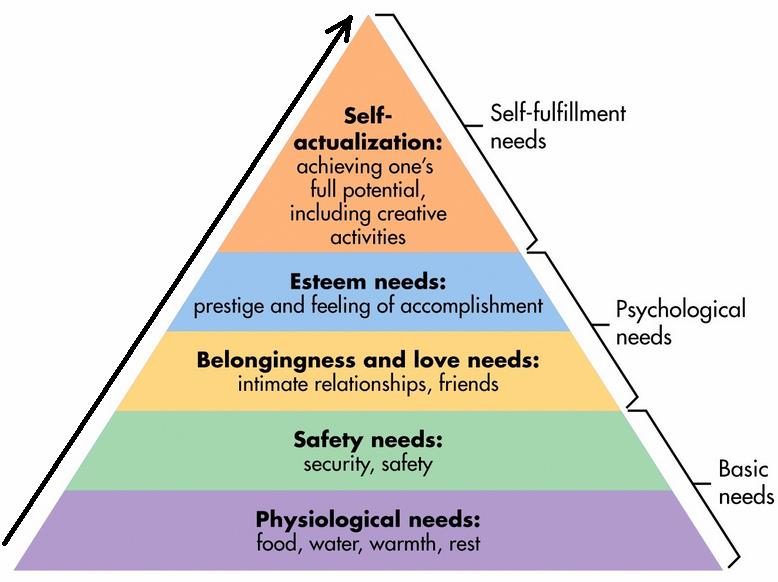Different Week, Same Old Story
Everybody loves a good story. Listen to any good author explain their process, and in between the idiosyncrasies, copious cigarettes and episodes of writer’s block, they’ll all tell you – get the reader invested. Write the characters and the overall story arc in such a way that the reader is drawn into the narrative, empathises with the main characters and their motivations and, most importantly, believes in the themes of good and evil that the story is setting up.
It’s the reason why highly successful TV shows like Game of Thrones or Breaking Bad attract extremely loyal fans over many years – they’re invested in an evocative storyline, typically identifying with their favourite characters, engaging in workplace banter and “theory-crafting” their favourite plot developments, loving the fact that they’re part of the show’s community.
They belong to something bigger than themselves.
This is primal stuff that anyone familiar with Maslow’s Hierarchy will tell you, comes after our most primitive survival needs such as food, water, warmth and security. More important than any notion of self-actualisation, personal development or individual accomplishment, we are creatures that rely on acceptance of the group, and have always relied on stories to keep the group entertained, aligned and connected to our past and future.

Up until recently our collective western narrative has been one of believing in God and country, freedom and opportunity, and belonging to family and community. We’ve benefitted from generation to generation as our forefathers improved things incrementally over time. We understand that the story that binds us together is bigger than ourselves, and whilst not perfect, has set the stage for what I have always assumed, perhaps naively, to be something the vast majority of us can share in with pride.
A story that binds us, that allows those in the group to believe in something bigger, that attracts outsiders to the group with promises of a better way of life, is a powerful one. It promotes a unity of purpose, encourages open and honest debate, and provides the stability upon which conflicts can be handled – yes, we won’t all agree on issues of politics, religion, race, sex, economic policy or labour relations, but our narrative underpins the common understanding that disagreement is not unhealthy and diversity of opinion or ideas is a positive.
I won’t for one minute pretend that our lengthy story has not had its fair share of tragedy, villainy, deceit and oppression, nor will I bother to try and convince its detractors that its self-evidently successful main narrative, heroic episodes, outstanding characters and ultimately tremendous recent chapters haven’t helped make our story the envy of the world, and one that we all in the Anglosphere should be extremely grateful to be a part of.
Not any more however.
Just as Hollywood is just now obsessed with subverting the expectations of fans for the purposes of political commentary and social justice activism, with Disney’s catastrophically awful ‘The Last Jedi’ being the prime example of the obsequious capitulation to authoritarian political correctness, so our story has been subverted by the political, academic and media classes to one that reads like a dystopian novel.
Were we as ignorant as large sectors of the liberal adult population in the West, conditioned soma-like on a daily diet of confected outrage, grievances and sanctioned agitprop from the various gender, race, climate or socialist activists that profess to be saving ourselves from the worst of our racist, over-populated, transphobic, xenophobic, traditional tendencies, we would similarly be reading along with ‘their’ ABC, the Guardian, and the rest of the left-leaning media conglomerate, immersing ourselves in the new bullshit story arc along with our fellow readers.

This week, for example, our story included the tragic tale of how a White Male tennis umpire bullied Serena Williams, a black woman, a champion, to the verge of tears, robbed her of a chance to win the US Open Tennis Title, in yet another example of toxic masculinity. The story did not end there, with an editorial cartoon by The Herald Sun featuring Williams in her tantrum-addled best receiving universal condemnation from our story’s new authors, such as the Washington Post or the usual rogue’s gallery of leftists, for its hateful portrayal of the black, female champion.
It was surreal to witness firsthand the discussions about Williams and the cartoon here in my office, the self-flagellation from white people, men in particular, desperate to maintain their place in the in-crowd of acceptable opinion, scrabbling to avoid the ignominy and alienation of not rooting for the poor black victim of racism in this story (ironically, the victim being the arrogant, obstreperous, infantile multi-millionaire, jet-setting tennis star, living a life of every conceivable creature comfort).
Equally illuminating was the groupthink on display by the Williams acolytes, for whom the story makes perfect sense given the narrative they’ve absorbed and come to believe.
In a world of increasingly authoritarian, incoherent social justice activism, is it any wonder then that censorship of those who would write a half-decent coherent story worth reading is so rife? That the enlightenment ideas of liberty, individualism, small government, free market economics, the concept of the West itself, are being re-cast as villainous, negative, oppressive, racist – a threat to the post-enlightenment ideals of equity, multiculturalism and globalism that our intellectuals-yet-idiots adore? That the promotion and veneration of those bad actors that actively seek to subvert everything we should be conserving for our children continues apace?
I confess that there’s little chance of altering our human urges to belong, to flock to a popular cause. We do however need a lot more courageous people willing to speak out against the stupidity and ignominy of the current narrative, to persuade the flock to believe in something worthwhile again.



